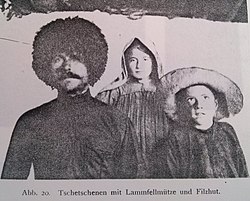The Chechens are an indigenous ethnic group primarily inhabiting the North Caucasus region, with their historic homeland centered in the modern-day Chechen Republic of the Russian Federation. They are part of the Vainakh peoples, which also include the Ingush, and speak the Chechen language (Nokhchiin mott), a member of the Northeast Caucasian language family. Chechens have a rich oral and clan-based culture with deep-rooted traditions of kinship, honor, and tribal affiliation. One of the key markers of social identity within Chechen society is the surname, which encodes not only lineage but also ancestral history, geographic origin, and cultural belonging.
The Chechens adopted traditional European-style surnames after the 1870s. Most of these were simple derivations from the name of the head of the family, with the addition of the Russian-style suffixes -ov or -ev. This is how Chechen surnames such as Kadyrov, Magomadov, Tapaev, and many others came into existence, all formed according to the same pattern. Despite containing typical Russian suffixes, these surnames are easily recognizable to most Russians as non-Russian in origin.
Chechen surnames are, in many ways, unique. For a long time, they functioned as part of an integrated clan-based system. As a result, even today, many Chechens have the ability to independently trace the history of their family or even their entire lineage.[1]
Research your ancestors on MyHeritage
History of Chechen surnamesHistory of Chechen surnames

Surnames have existed among Chechens since ancient times, although in a distinctively Chechen form. Traditionally, individuals were identified by the name of a clan elder with the suffix -gIar or -gIer, denoting lineage or kinship. For example, AkhmadgIar means “people of Akhmad’s clan.”
According to the conventions of nokhchiyn mott (Chechen etiquette), such identifiers were usually placed before the bearer’s given name.
Chechens were also frequently identified by their teip (tribal affiliation) or place of origin. For example, the 19th-century Chechen military commander Baysangur of Benoa (Benoisky) took his name from the Benoy teip and village.[1]
Sources of Chechen surnamesSources of Chechen surnames
Among Chechens, surnames were typically derived from the name of a close male ancestor. However, there are also cases where the surname was formed from the name of the clan or family lineage itself. Examples include: Terloyev, Merzhoyev, Gunoyev, and Dishniyev.
One of the primary sources of Chechen surnames is the names of various Vainakh teips (clans). These often take the Russianized form ending in -oyev or -ojev, such as Khaykhoyev, Tsuroyev, or Chermoyev. Surnames also derive from smaller lineages within teips (called gary and nekkhe), as well as from specific localities and auls (mountain villages).
It is also common for surnames to be based on legendary ancestors or epic heroes — sometimes real historical figures. For example, the surname Chaborzayev stems from the name Chaborz, a term that can refer either to a wolf or a bear in Chechen symbolism and epic tradition.[2]
According to historian Abram Shovkhelishvili, traditional Vainakh surnames often end with a long vowel, such as -si or -a, which explains the widespread occurrence of -ayev and -iyev endings among Chechen surnames today.
Modernization and Russian influenceModernization and Russian influence
Surnames in the European sense—structured around the Slavic -ov/-ev suffix—began to spread among Chechens approximately a century ago, following the incorporation of Chechnya into the Russian Empire. These surnames became widespread with the Soviet-era passportization process, during which many were formalized.
In most cases, these Russian-format surnames were derived from the personal name of the passport recipient's father or grandfather, with the addition of -ov/-ev endings. Examples include Lorsanov and Vakhaev.
While widely used today, these suffixes are linguistically foreign to the Chechen language and have no grammatical equivalent in Chechen. Their adoption reflects the imposition of imperial and Soviet naming conventions rather than organic linguistic development.
Chechen surname structure and revival effortsChechen surname structure and revival efforts
Authentic Chechen surname forms involve adding the suffixes -gIer or -gIar to a father's or ancestor’s name, often preceded by the linking vowel "i". The suffix -gIer is typical of the mountain dialect, while -gIar is common in the literary lowland dialect.[3]
In spoken Chechen, it is common even today to hear such forms appended unconsciously to Russian-style surnames, e.g., LorsanovgIer vu (“I am from the Lorsanov family”).
The suffix -gIer also carries the meaning “squad” or “company” in mountain dialects, which may suggest older social structures embedded in name formation.
Orthographic and linguistic distinctionsOrthographic and linguistic distinctions

Due to the lack of a Chechen glottal stop letter "I" in the Russian alphabet, Chechen surnames in Russian documents appear as Lorsiger or Vakhiger, whereas the correct Chechen form is LorsigIer or VakhigIer. In international Latin transliteration, these surnames can be rendered as Lorsiger, Vakhiger, preserving approximate phonetics.
The structure -igIer (Chechen), -iger (English), or -игер (Russian) could serve as a unique ethnolinguistic marker of Chechen identity—similar to -ov/-ev in Russian or -dze/-shvili in Georgian naming traditions. Widespread adoption of these forms would visually and phonetically identify bearers as likely Chechens.
De-Russification of Chechen surnamesDe-Russification of Chechen surnames
Advocates of cultural revival argue that restoring native Chechen surname structures is essential for the preservation of national identity, language, and tradition. This process includes reevaluating externally imposed naming patterns and promoting organic Chechen linguistic forms. Gradual implementation of traditional surname models is seen as a small yet meaningful step toward maintaining ethnic continuity in a globalized context.
Today some Chechens — like members of other Caucasian peoples, such as the Adyghe — are increasingly choosing to use their surnames without the Russian suffixes. For example, they may identify themselves as “Tsarni” instead of “Tsarnaev”, “Makhauri” instead of “Makhaurov”, or “Bek” instead of “Bekov”, and so on. This trend is especially common among Chechens who, due to historical circumstances, live outside the Russian Federation.
By contrast, the numerous Jordanian Chechens (urdanera Nokhchiy) have never used Russian-style surname endings like -ov, since their ancestors emigrated to the Ottoman Empire in the 19th century. Their naming traditions remain distinct. For instance: Ahmed Arslan Alauddin, Samih Beno, and others.
Research your ancestors on MyHeritage
Celebrities with Chechen surnamesCelebrities with Chechen surnames
- Makhmud Esambayev, Soviet ballet master and choreographer
- Ramzan Kadyrov, president of the Chechen Republic
- Salman Yusupov, Soviet writer and poet
- Zelimkhan Khadjiev, basketball player
- Ramazan Şahin, born Ramzan Irbaikhanov, Turkish freestyle wrestler
- Buvaisar Saitiev, French freestyle wrestler
- Mohammad Omar Shishani, Jordanian football player
- Zaur Sadayev, Russian football player
- Natalia Estemirova, Russian human rights activist
See moreSee more
Explore more about Chechen surnamesExplore more about Chechen surnames
- Russia - Collection Catalog at MyHeritage
- Chechen Submitted Surnames

